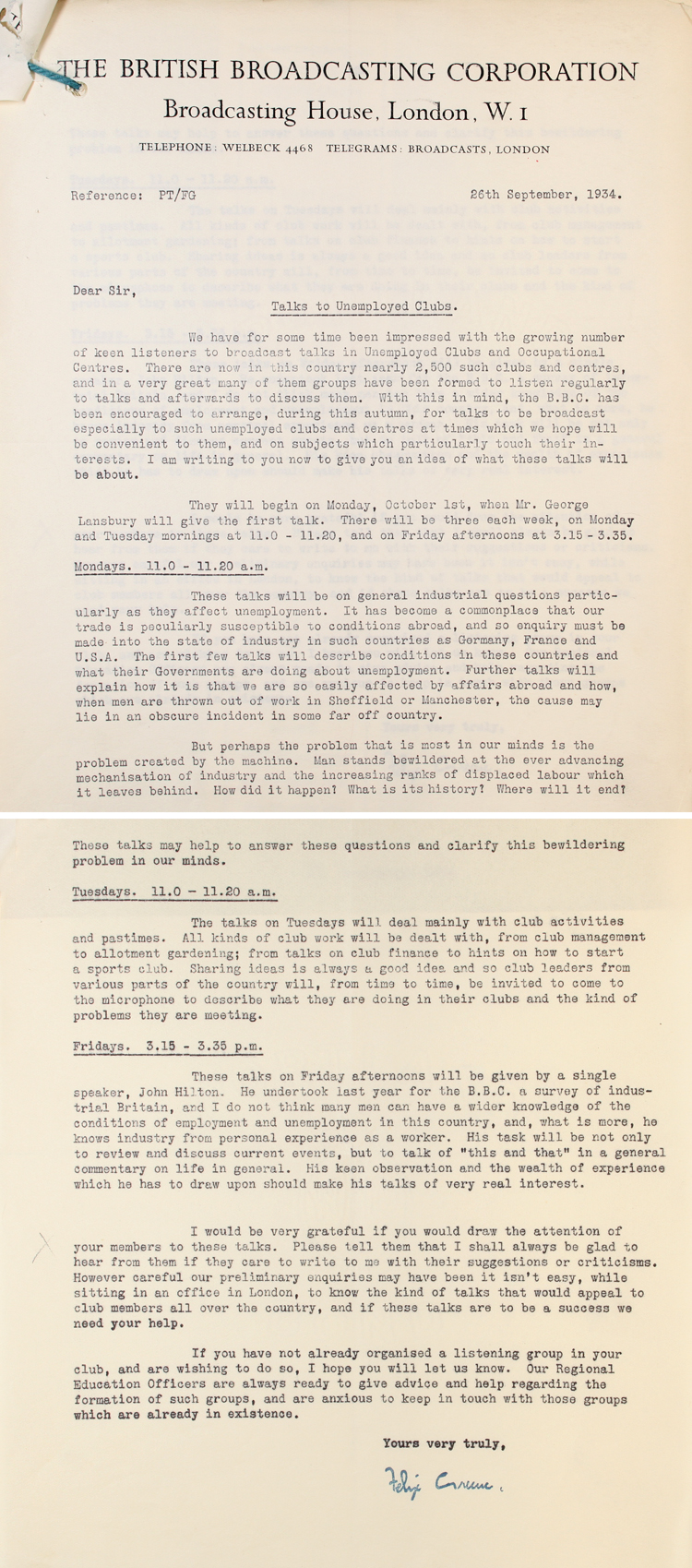
Letter from the BBC sent to the secretaries of all Unemployed Clubs and Occupational Centres in September 1934 (AST 7/92)
Transcript
THE BRITISH BROADCASTING CORPORATION
Broadcasting House, London, W.1
Telephone: Welbeck 4468 Telegrams: Broadcasts, London
Reference: PT/FG
26th September, 1934.
Dear Sir,
Talks to Unemployed Clubs
We have for some time been impressed with the growing number of keen listeners to broadcast talks in Unemployed Clubs and Occupational Centres. There are now in this country nearly 2,500 such clubs and centres, and in a very great many of them groups have been formed to listen regularly to talks and afterwards to discuss them. With this in mind, the B.B.C. has been encouraged to arrange, during this autumn, for talks to be broadcast especially to such unemployed clubs and centres at times which we hope will be convenient to them, and on subjects which particularly touch their interests. I am writing to you now to give you an idea of what these talks will be about.
They will begin on Monday, October 1st, when Mr. George Lansbury will give the first talk. There will be three each week, on Monday and Tuesday mornings at 11.0-11.20, and on Friday afternoons at 3.15-3.35.
Mondays. 11.0-11.20 a.m.
These talks will be on general industrial questions particularly as they affect unemployment. It has become a commonplace that our trade is peculiarly susceptible to conditions abroad, and so enquiry must be made into the state of industry in such countries as Germany, France and U.S.A. The first few talks will describe conditions in these countries and what their Governments are doing about unemployment. Further talks will explain how it is that we are so easily affected by affairs abroad and how, when men are thrown out of work in Sheffield or Manchester, the cause may lie in an obscure incident in some far off country. But perhaps the problem that is most in our minds is the problem created by the machine. Man stands bewildered at the ever advancing mechanisation of industry and the increasing ranks of displaced labour which it leaves behind. How did it happen? What is its history? Where will it end? These talks may help to answer these questions and clarify this bewildering problem in our minds.
Tuesdays. 11.0-11.20 a.m.
The talks on Tuesdays will deal mainly with club activities and pastimes. All kinds of club work will be dealt with, from club management to allotment gardening; from talks on club finance to hints on how to start a sports club. Sharing ideas is always a good idea so club leaders from various parts of the country will, from time to time, be invited to come to the microphone to describe what they are doing in their clubs and the kind of problems they are meeting.
Fridays. 3.15-3.55 pm
These talks on Friday afternoons will be given by a single speaker, John Hilton. He undertook last year for the B.B.C. a survey of industrial Britain, and I do not think many men can have a wider knowledge of the conditions of employment and unemployment in this country, and, what is more, he knows industry from personal experience as a worker. His task will be not only to review and discuss current events, but to talk of “this and that” in a general commentary on life in general. His keen observation and the wealth of experience which he has to draw upon should make his talks of very real interest.
I would be very grateful if you would draw the attention of your members to these talks. Please tell them that I shall always be glad to hear from them if they care to write to me with their suggestions or criticisms. However careful our preliminary enquiries may have been it isn’t easy, while sitting in an office in London, to know the kind of talks that would appeal to club members all over the country, and if these talks are to be a success we need your help.
If you have not already organised a listening group in your club, and are wishing to do so, I hope you will let us know. Our Regional Education Officers are always ready to give advice and help regarding the formation of such groups, and are anxious to keep in touch with those groups which are in existence.
Yours very truly,
Felix Greene
